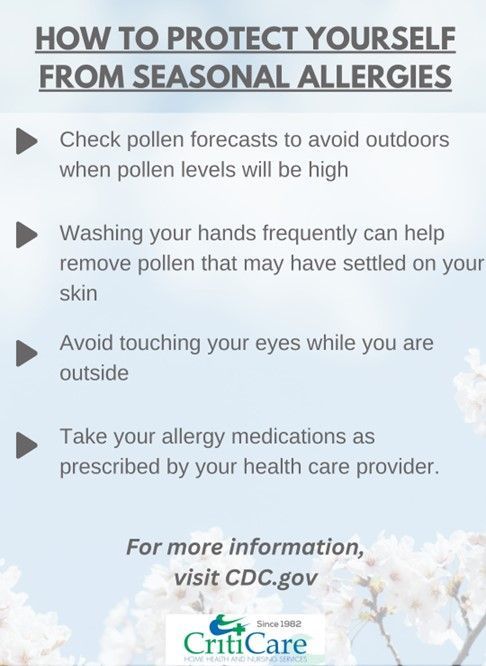Surviving Spring
Jessica Barnett • April 1, 2024

It's official—Spring has arrived! Seasonal allergies frequently hit many people during this time of year. Springtime seasonal allergies are frequently brought on by pollen from weeds, grasses, and trees. Sneezing, itchy eyes, runny nose, and congestion are some of the symptoms. Springtime weather also attracts insects, such as bees, in addition to seasonal allergies. People who get bee stings may experience allergic reactions, some of which may be severe. To ensure the health and safety of both our caregivers and our patients at CritiCare, this post will go over ways to stay alert during this season.
Stay Indoors During Peak Pollen Times:
Checking the pollen levels in the areas CritiCare sends our nurses and personal care assistants will allow our caregivers to be prepared. It will also help you to determine whether to spend the day outside. Especially if you are caring for a patient or student that has severe allergies, it is best to stay inside during a peak. A resource to use that provides the pollen count in your area is https://weather.com/.
Keep Windows Closed:
When our nurses and aides are working in a client’s home, keeping windows closed during high pollen seasons will help prevent pollen from entering the home. Also, if you are a nurse working on a bus run, keeping the bus windows closed can also make a difference.
Wash Your Hands:
Regular hand washing might lessen allergy symptoms by removing pollen that may have stayed in your skin. Our caregivers should always practice washing hands, especially when you come inside to your patient’s home or school from outside. This will help to reduce symptoms. Working as a healthcare worker, this is something that should already be a habit.
Now that we have gone over seasonal allergy prevention for caregivers, we will review bee sting allergies. If our clients are allergic to bee stings, it is crucial that our nurses and aides keep these tips in mind to minimize the risk of severe reaction.
Avoid Bee Sting Exposure: Try to avoid areas where bees are known to be active, especially during the warmer months. According to the Centers of Disease Control and Infection (CDC), it is recommended to wear light-colored clothing and avoid wearing perfumes or scented lotions that may attract bees.
Remain Calm:
If a bee begins flying around, it is best to maintain your composure. Swatting at the bee might encourage it to sting you.
Carry Medication: Before our nurses begin their assignment, they are always provided with a care plan for the patient. By reviewing a patient’s care plan, you can educate yourself on any allergies they might have. Particularly, if the client has been diagnosed with a bee sting allergy. If this is the case, always carrying their prescribed emergency medication such as an epinephrine auto-injector (EpiPen) with you is crucial. This emphasizes again the importance of our nurses’ reviewing patients care plans beforehand.
While working in the field as a nurse or a personal care assistant, it is important to monitor for any signs of an allergic reaction if your client gets stung. Symptoms of this could include pain, redness or swelling around the sting. If this happens, seek medical attention immediately.
In terms of caring for the bite, the CDC recommends cleaning it well with soap and water first. Next, it is important to remove the sting without using tweezers. Removing the stinger by scraping a fingernail over it or wiping it off with clean gauze is the safest way. Finally, after the stinger is removed it is best to apply a cold compress or ice pack. This will help reduce any swelling and ease the pain. Should this ever happen during an assignment working as a nurse or caregiver, make sure to document it and inform the Nursing Supervisor at CritiCare.
Springtime brings warmer weather, but that doesn't mean we should lose awareness of our surroundings. CritiCare has provided this information for our caregivers to constantly be aware no matter what time of the year.


When choosing home healthcare services, it’s essential to understand what it means to work with a licensed skilled agency. A skilled license ensures that you or your loved ones receive a full spectrum of care, ranging from companion services to high-tech nursing and physical therapy. This designation signifies that the agency meets strict regulatory standards and employs qualified healthcare professionals to provide specialized medical care in the comfort of your home. Beyond simply offering medical assistance, a licensed skilled agency is a trusted provider that delivers a comprehensive and structured approach to patient care. These agencies are regulated by healthcare authorities to ensure they meet the highest standards of patient safety, ethics, and professional care.










